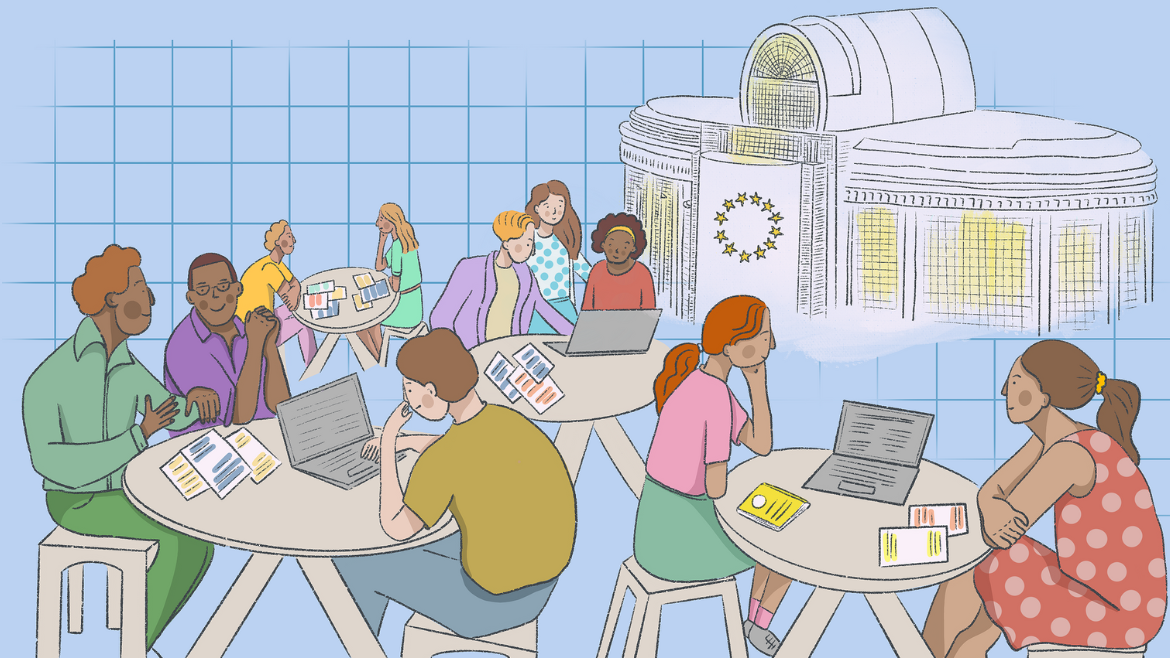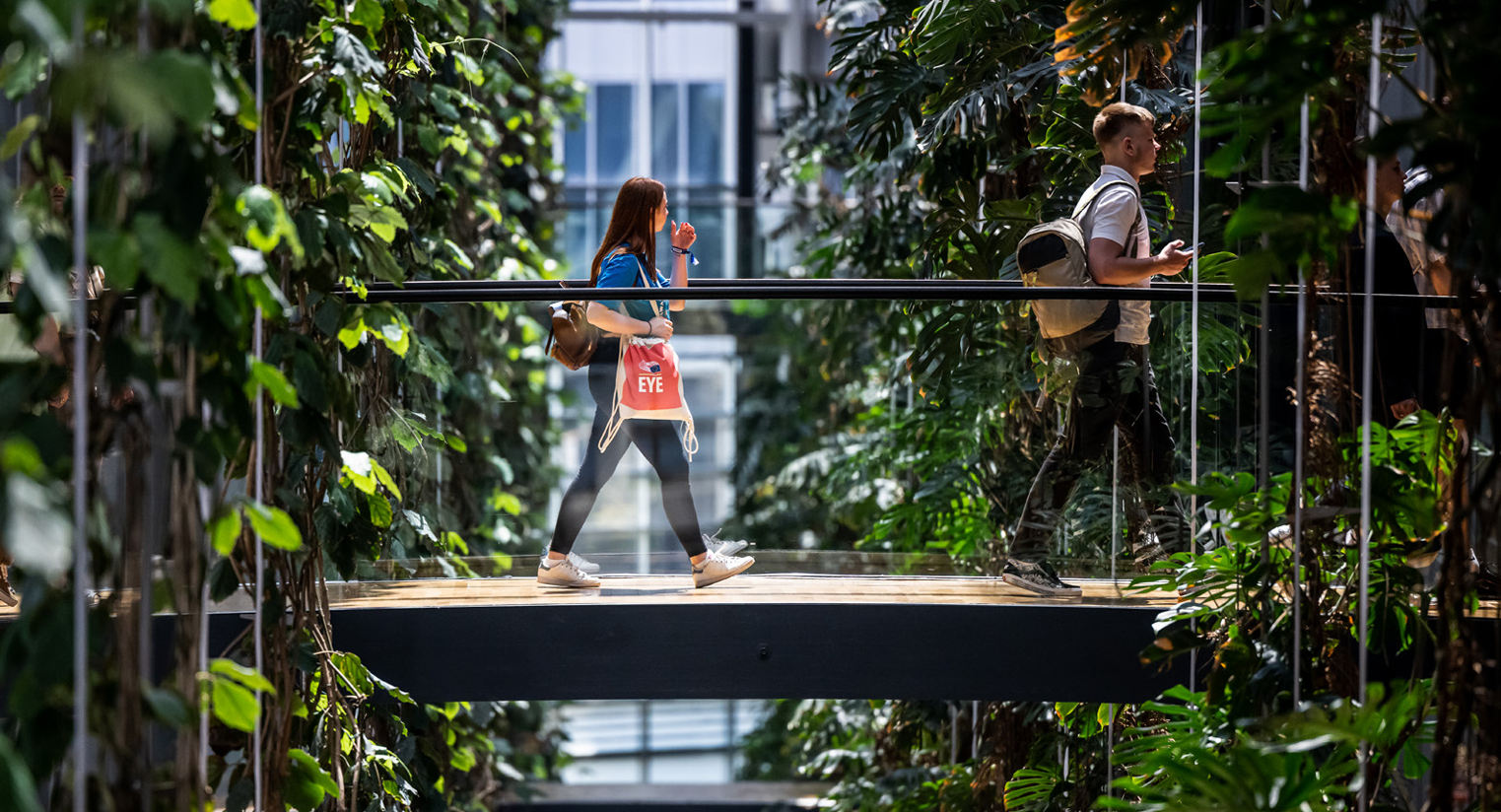
Illustration by Daniela Nunes
A spotlight on how EU institutions are fostering youth participation in democracy
by Lorena Barić
Welcome to 2024, a pivotal year in European democracy, the year of the European Parliament elections, which are set to take place on 6-9 June across the 27 European Union (EU) member states. With 366 million EU citizens eligible to vote, these elections are particularly significant for the nearly 30 million young Europeans who will have their first opportunity to cast their vote – a milestone moment for their contribution to shaping the future of Europe.
Since the first European elections in 1979, voter turnout has generally been low, except in 2019, when turnout reached an unprecedented 50.6%. According to a Eurobarometer survey commissioned by the European Parliament, this increase was largely attributed to youth participation. Among the primary reasons for voting, 52% of respondents cited a sense of civic duty. However, what led to this significant increase in civic duty in 2019 compared to previous years dating back to 1979? There are undoubtedly several factors, including lowering the voting age in some countries and extending voting hours. Yet, the most prominent reason appears to be the effective communication efforts from the European Parliament and other EU institutions, which helped create a positive perception of the EU and reinforced the importance of each vote.
With the 2024 European elections approaching, the question arises: will the European Parliament and other EU institutions manage to further increase young voter turnout? Let's examine the various initiatives, projects, and campaigns being implemented to ignite democratic engagement and foster youth participation.
 The European Parliament's key initiatives fostering youth participation
The European Parliament's key initiatives fostering youth participation
The European Parliament (EP) is more than just a legislative body – it's a symbol of democratic unity. The EP buildings in Brussels and Strasbourg are adorned with the flags of all member states. Each flag waves as a testament to the diversity and shared values of democracy that bind the member states together.
Focusing on increasing youth participation, which is particularly emphasised this year due to the upcoming elections, the EP has on offer several initiatives, campaigns and resources designed to support young people in taking a more active role in democratic processes. These efforts are not limited to the European elections; they always represent a comprehensive and ongoing effort to enhance youth engagement.
Together.eu – the EP has set up an online platform to host the community of people who believe in democracy and who want to give it real meaning as the next European elections approach. Together.eu promotes debates and events to engage with the democratic process. The platform also offers various e-learning modules and a news section offering up-to-date news about youth opportunities. It’s about more than just voting – it’s about being a part of the conversation before and after elections, deepening young people's connection to European issues and providing information about what the EU offers young people.
Euroscola – offers the experience of becoming an MEP for a day. Participants gather in the EP's chambers in Strasbourg to debate, vote, and pass resolutions on real European issues, providing them with a practical understanding of EU politics.
European Parliament Ambassadors programme – present in over 1500 high schools across the EU, this programme seeks to enrich students' understanding of European parliamentary democracy and the role of the European Parliament and European values. Students actively participate in this programme by also educating and informing their peers about the EU. For example, they may set up an EU Info Point in their schools with teacher support, inspiring them to share their knowledge within their communities.
European Youth Event (EYE) – a biennial event that attracts thousands of young people from across Europe and beyond to share and shape their ideas on Europe’s future. The next one will take place in 2025. It is a unique opportunity for 16- to 30-year-olds to interact, inspire each other and exchange their views with experts, activists, influencers and decision-makers, right in the heart of European democracy. During the EYE, participants discuss wide-ranging topics relevant to the EU's future. These discussions culminate in the European Youth Hearing, an important session where young attendees present their top-voted ideas to Members of the European Parliament and other leaders, aiming to influence the EU's future directions.

Image: European Parliament
Local EYEs – the local editions of the European Youth Event, taking place every two years. They aim to bring the spirit of the central EYE event closer to young Europeans by facilitating regional gatherings where young people aged 16 to 30 can connect with peers, engage in meaningful discussions, and exchange ideas on Europe’s future with experts, activists, and decision-makers. These regional events are co-funded and supported by the European Parliament but are organised by local youth organisations. This collaboration ensures that the events are tailored to address local interests and needs while fostering a sense of connection to broader European issues. The local EYEs are designed to empower young people to become active citizens and encourage their involvement with the European Parliament, enhancing their understanding of and participation in European democracy. In 2024, local EYE’s took place in Berlin (Germany), Vilnius (Lithuania), Forli (Italy) and Brežice (Slovenia).
The Parliament's campaign for the 2024 elections – centres on two main themes: "delivery" and "democracy." Concerning the former, EU citizens were informed about Europe’s impact – particularly that of the European Parliament – on their daily lives. The campaign’s tagline, "Use Your Vote. Or others will decide for you," emphasizes the critical importance of each individual's vote. The outreach efforts include a 4-minute video entitled "Pass it on", featuring testimonials from senior citizens across various EU countries. These testimonials convey stories about democracy to younger generations, highlighting that democracy should never be taken for granted.
The European Elections 2024 educational toolkit – designed for educators in both formal and non-formal settings, offers resources and ideas on how to engage young people in a conversation about the impact of the EU on their lives, the roles and functions of the European Parliament, the significance of voting in the European elections and the importance of being an active citizen after elections as well. The toolkit is divided into six comprehensive modules, each simplifying the complexities of EU politics into engaging and digestible pieces, such as:
- Module 1: Why vote in the European elections 2024? – by highlighting the profound impact of each citizen's vote, this module motivates young people to recognise their influential role in democratic processes. It provides educators and youth workers with a diverse range of questions and resources to engage young voters, from those reluctant to vote to those well-versed in their electoral preferences.
- Module 2: Disinformation – equips youth with critical media literacy skills necessary to identify and combat disinformation and misinformation. It covers various forms of false information, including rumours, deliberate lies, and strategic disinformation campaigns, and discusses tools like deep fakes and social media bots.
- Module 3: How does the EU impact my life? – by detailing the tangible effects of EU policies on daily life, this module helps young people understand the EU's role in their everyday experiences, from environmental policies to consumer rights and mobility opportunities like the Erasmus+ programme.
- Module 4: What is the role of the European Parliament? – provides resources and questions to help young people understand the functioning and purpose of the European Parliament.
- Module 5: Becoming an active European citizen – gives a detailed overview of all EP initiatives for young people, such as the EYE, together.eu, Euroscola, and others. By doing so, this module encourages ongoing civic engagement emphasising the importance of staying involved in democratic processes even after elections.
- Module 6: Young people take action – focuses on practical steps for active citizenship and inspires young people to initiate change and make their voices heard by offering ideas and actions they can take to become active citizens.
 Initiatives by the European Commission
Initiatives by the European Commission
The European Youth Week – the European Commission's key youth event, which is also a biennial celebration fostering youth engagement, participation, and active citizenship throughout Europe and beyond. In 2024, the Youth Week was held on 12-19 April, strategically scheduled two months before the European elections to highlight its focus on democracy and the upcoming elections under the tagline "Voice Youth Vision." The central event took place in Brussels, but individuals across Europe were encouraged to organise and promote local events through the European Youth Portal. Remarkably, almost 2 000 events were organised, attracting approximately 1.786 million young people across 39 countries.
LevelUP! 2024: I care, I vote" – organised by the European Youth Forum with the support of the European Parliament and the European Commission, is a capacity building and networking event where activists can connect with experts and organisations to amplify their messages. Designed for anyone at any stage of their activism journey, whether they are newcomers or have some experience, LevelUP! tailors its resources to match participants' skills, supporting those who aspire to make a positive impact on issues they are passionate about. This year’s event was also centred around the European elections and took place in the European Parliament in Brussels on 12-13 April.
Would you like to know more? Read the article about the European Youth Week and LevelUP!

Image: European Parliament
 How do we walk the talk when it comes to supporting youth participation and democratic engagement?
How do we walk the talk when it comes to supporting youth participation and democratic engagement?
As you can discover throughout this issue of Coyote, there are numerous initiatives, campaigns, resources, and best practice examples, along with a variety of stakeholders all dedicated to enhancing youth participation. These efforts aim to encourage as many young people as possible to engage in democratic processes in various forms – be it through activism, education about democracy, voting, and more. At times, the landscape might appear saturated with similar campaigns across Europe, but this is beneficial as it broadens the opportunities to connect meaningfully with every young person.
How do we embody this commitment? We actively participate, share experiences, and best practices, and inspire more young people to support their peers using all available resources. By using tools and resources provided by the European institutions, we can help bridge the gap between young citizens and European democratic mechanisms. As the 2024 European elections approach, the role of youth workers and educators becomes even more crucial. These professionals are more than just facilitators of knowledge; they are essential in promoting youth participation, not only for the upcoming elections but also in ongoing civic activities at all levels – from local to European. They help young people understand the significance of their voices and actions in shaping policies and decisions that impact their lives. This guidance is crucial in motivating young people to not only vote but to fully engage with democratic processes.
Lorena is an editor of Coyote magazine, a writer, and a youth information worker.
This article was written in co-operation with the Youth Outreach Unit of the European Parliament.



